This is a post by guest contributor, Kristee Ravan. Kristee lives in Oklahoma with her husband, three kids, and cat. She keeps busy with homeschooling, twin-wrangling, and supporting her husband’s ministry as a pastor. She has been writing and publishing devotions for several years and has also published two tween novels. Her books, The Cinderella Theorem and Calculating Christmas are available on Amazon.com. Kristee felt a call to be a missionary in childhood which led her to the jungles of Bolivia for two years after college. She was surprised when God called her back to the United States, but has been delighted with the ministry opportunities He planned for her, including supporting foster and adoptive families (and being an adoptive family!), educating others about how trauma affects children, and writing. You can connect with her on her Facebook author page, Kristee Ravan.

“Lord, you have been our dwelling place in all generations.” (Psalm 90:1, ESV)
The introduction to Psalm 90 records that this is “Of Moses the Man of God.” My daughter and I have used a scripture memory song for this Psalm in our homeschool for years, yet I have never stopped to think about the metaphor right there in the first verse.
The Lord is our dwelling place. What does that mean? He’s the house (or tent in Moses’s case)? Or He’s our safe place?
A quick Google search revealed that a “dwelling place” is the place where someone lives. We can’t know exactly when in his life Moses wrote this Psalm, but in my opinion, it makes sense for it to be written during those forty wandering years in the wilderness. The poignant cry that the Lord is our dwelling place seems to come from people who have no literal, permanent home.
A Look Back
What might those desert-trotting Israelites have felt when they sang Moses’s new Psalm? As we probably learned in Sunday School, they had no home. They were wanderers, nomads, transient refugees. Having the Lord as their dwelling place gave them an identity.
In an everyday sense, a dwelling place for them would have been the literal tents they were dwelling in. How is the Lord like a tent? He offered them safety, peace, and rest. Having the Lord as their dwelling gave them security.
But a tent was only safety and security so long as they chose to go into it. They were welcome to sleep outside that protection if they liked. They had to be the ones to make the choice to go into the tent–the Lord as their dwelling place–and participate in the things that came with that relationship with Him. Having the Lord as their dwelling gave them responsibility.
A Look at Us
Actually, the same points apply to us. When we choose to make the Lord our dwelling place, He becomes those things for us as well. And honestly, I wept when I found this verse as I looked for a metaphor to write about. I needed it. I was cramming a writing session in between hard, hard things in our family.
I need Him to be my identity, my permanency–not being a wife, a mother, a homeschooler. Those things shouldn’t be the biggest part of who I am. He should.
I need Him to be my security. My trust, my faith, my hope should all stem from the rock-solid dwelling place that is the Lord. When I re-enter that metaphorical tent, I should come out trusting only Him for finances, children’s futures, medical issues.
In Matthew 7, Jesus compares people who don’t fully trust His words with a foolish man who built his house on sand. (Although, technically, that’s a simile. Jesus used the word “like.” “And everyone who hears these words of mine and does not do them will be like a foolish man…” Matthew 7:26, ESV) Why wouldn’t I trust Him and build on the rock?
But having Him as your dwelling place does require responsibility. We have to choose to go to Him with our troubles. We have to actively talk to Him about our day in order for Him to become our identity and security. For me, this means setting alarms to remember to pray throughout the day and carving out time in my morning and evening routines to dwell with Him.
A Word about the Generations
The second part of the verse says the Lord had been their dwelling place “in all generations.” What were the Isrealites reflecting on in that part of the song?
Abraham, who left his literal dwelling place in Ur to follow where God would tell him to go. He was led to a new dwelling place with God.
Jacob, who fled his literal dwelling place to live for years in another land. He discovered a new dwelling place with God.
Joseph, sold away from his literal dwelling place into slavery in Egypt. He found a new dwelling place with God.
And the same is true for us. I can see in my own family how our different generations have made Him their dwellings: when my great-grandparents trusted him during the Great Depression when my grandmother sought peace and strength from Him after her husband left her, and when my parents made Him their dwelling in seeking hope through daily prayer and Bible study.
I pray my children will look back on what has been a hard season for our family and realize I made God my dwelling place through trusting Him in the storms of life.
Dwell in Him. Make Him your peace and security. Fulfill your role in being another generation that dwelled in Him.

Join the Discussion